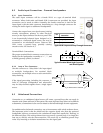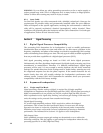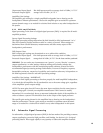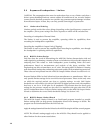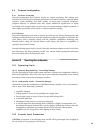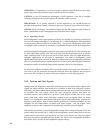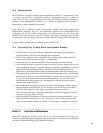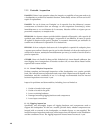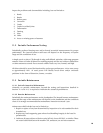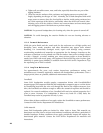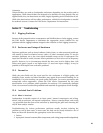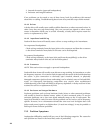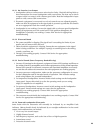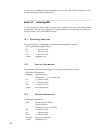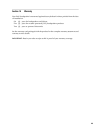
12.5.1 No Sound or Low Output
1. Loudspeaker cables or connectors are mis-wired or faulty: Check all cabling. Refer to
these instructions for correct loudspeaker cable connections. The best way to check
a suspect cable is to swap it with a known good cable. Read the loudspeaker's input
panel to verify correct cable connections.
2. Electronic equipment is not turned on or level controls are not adjusted properly:
Make sure that all equipment in the signal path is powered up and that all controls
are set to appropriate levels for normal operation.
3. Loudspeaker is not working: Connect the signal cable to a known good loudspeaker
leaving all equipment set to the same levels. If the problem disappears, the
loudspeaker is probably not working. Contact EAW Service for appropriate
troubleshooting.
12.5.2 Distorted Sound
1. The power amplifier is clipping: The signal level is exceeding the limits of your
system and you must reduce the level.
2. Other electronic equipment is clipping: Ensure that no equipment in the signal
chain is being overdriven. For example: input(s) or summing bus in the mixing
console, equalizers, etc.
3. Driver(s) not working properly: Contact EAW Service for appropriate
troubleshooting.
12.5.3 Partial Sound (Some Frequency Bands Missing)
1. Incorrect EQ settings in the electronic equipment: Ensure all EQ settings and filters on
the mixing console or preamplifier and on other equipment are set for normal operation.
Ensure level controls on electronic crossovers and associated amplifiers are correctly
set and that all cables and connections for such equipment are working properly.
2. Incorrect processor configuration: Make sure the processor configuration is correct
for the loudspeaker and its intended mode of operation. This includes settings
made using software for powered loudspeakers.
3. For unpowered loudspeakers: Incorrect mode switch settings on the loudspeaker
input panel. Ensure this switch is set for the operating mode you are using:
single, bi-amplified or tri-amplified.
4. For powered loudspeakers: Incorrect control switch settings on the loudspeaker
input panel. Ensure switch settings are correct for the application.
5. Driver(s) not working properly: Contact EAW Service for appropriate
troubleshooting.
6. The crossover network inside the loudspeaker is not working properly: Contact EAW
Service for appropriate troubleshooting.
12.5.4 Powered Loudspeaker Electronics
Some faults with the electronics will normally be indicated by an Amplifier Fault
indicator. Others should clearly be indicated by an outright malfunction in the sound
output. Such malfunctions can include:
1. No or very low sound output
2. Highly distorted sound
3. Bad frequency response, such as the loss of low or high frequencies
4. Intermittent sound
5. Excessive electronic noise
23



